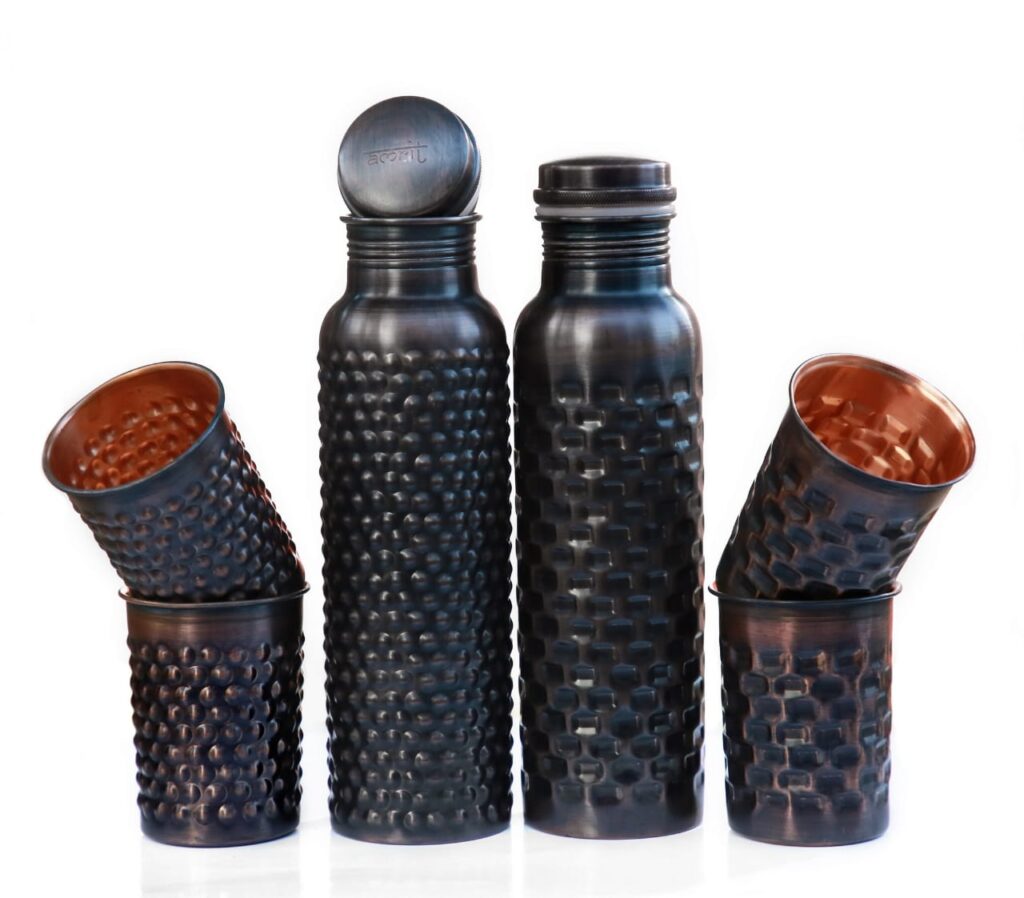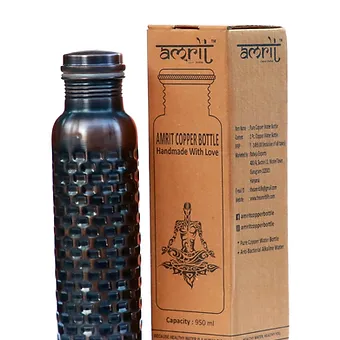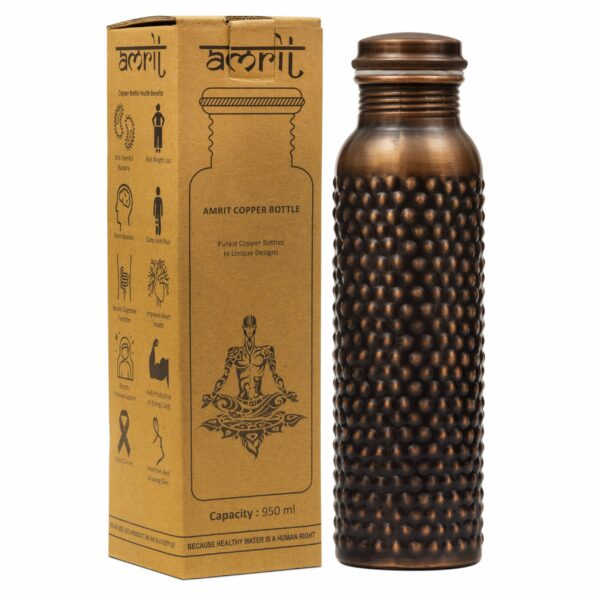Copper Bottle has been a fundamental part of human civilization for thousands of years. It was one of the first metals to be extracted and used by humans, with evidence of its use dating back to around 8000 B.C. Copper’s early discovery and use are attributed to its natural occurrence in relatively pure forms. Throughout history, it has been utilized for a variety of purposes, from creating coins and ornaments to forming tools that helped civilizations transition from the Stone Age.
The Copper Age, a period when copper came into regular use, occurred before the Bronze Age, which saw the substitution of copper with bronze—an alloy of copper and tin. This transition happened between 3500 to 2500 BCE in West Asia and Europe. The ability to extract copper from ore bodies was well-developed by 3000 BCE, and it played a critical role in the growth of copper and copper alloys use.
In modern times, there has been a resurgence of interest in copper for health and wellness, particularly in the form of copper water bottles. These bottles are lauded for their antimicrobial properties, which can potentially kill harmful bacteria. In India, copper water bottles are believed to offer health benefits, such as aiding digestion and promoting joint health.
However, they require regular cleaning to prevent tarnishing. Copper’s role in human health is well-documented, as it is an essential mineral involved in several physiological processes, including energy production, iron metabolism, and the functioning of the immune system.
-
Amrit Antique Brick Copper Bottle| 950ml, 300 gms| No Outer Cleaning Required
Original price was: ₹1,499.00.₹1,199.20Current price is: ₹1,199.20. -
Amrit Antique Copper Bottle and Glasses | No Outer Cleaning Required
Original price was: ₹2,199.00.₹1,759.20Current price is: ₹1,759.20. -
Amrit Antique Pine Copper Bottle| 950ml, 300 gms
Original price was: ₹1,499.00.₹1,049.00Current price is: ₹1,049.00.
What happens if we drink water in Copper Bottle
The Science Behind Copper and Water
The oligodynamic effect is a fascinating scientific phenomenon where small amounts of heavy metals like copper have a significant antimicrobial effect. Copper ions, even in low concentrations, can kill a wide range of microorganisms, including bacteria, viruses, fungi, and algae. This effect was first discovered in 1893 and has been utilized for its antibacterial properties since ancient times.
When copper comes into contact with water, it releases ions that interact with the water. These copper ions can bind to the cell membranes of microorganisms, causing them to rupture and die. This is why copper vessels have been traditionally used to store water, as they can purify it by killing harmful bacteria.
In terms of chemistry, when copper ions are in water, they can form free metal cations, soluble complexes, and insoluble particles or precipitates, depending on the mineral content and pH of the water. For example, free copper ions (Cu^2+) are soluble and are the preferential form at low pH levels. These ions can cause membrane damage to bacteria by affecting the proteins in the bacteria’s cell walls, leading to their inactivation.
This interaction between copper and water is not only important for its antibacterial properties but also for understanding the taste of water stored in copper vessels. The presence of copper can impart a metallic taste to water, and the taste thresholds for copper in water have been studied to ensure that the levels are acceptable for human consumption.

Health Benefits of Drinking Water from a Copper Bottle
Drinking water from a copper bottle is believed to offer several health benefits due to the oligodynamic effect of copper, which imbues the water with antimicrobial properties.
Here’s a summary of the potential benefits:
- Antibacterial Properties: Copper’s ability to kill harmful bacteria keeps the water pure and safe, which may help in reducing the risk of waterborne diseases.
- Boosted Immunity: Copper plays a role in the development and maintenance of immune cells, potentially strengthening the body’s defense system.
- Improved Digestion: Copper ions can stimulate the production of digestive enzymes, aiding the digestive process and reducing problems like indigestion and acidity.
- Enhanced Skin Health: Copper is involved in the production of new cells, which can contribute to clearer, healthier skin. It’s also linked to the pigmentation of the skin.
- Anti-Aging Effects: Copper’s antioxidant properties may help in reducing fine lines and wrinkles, slowing down the aging process.
- Heart and Brain Health: Copper is essential for heart and brain health, supporting the development of brain and heart tissue and the functioning of the nervous system.
- Thyroid Regulation: Copper plays a role in balancing thyroid gland activity, although the exact mechanisms are not fully understood.
- Joint Health: Anecdotal evidence suggests that copper may help alleviate joint pain and inflammation, although more research is needed in this area.
The Right Way to Use a Copper Bottle
Using a copper bottle correctly is essential to reap the health benefits while ensuring safety.
Here’s a guide on how to properly use and maintain a copper water bottle:
Proper Usage:
- Initial Cleaning: Rinse the bottle with water before first use.
- Filling: Fill the bottle with water and let it sit for 6-8 hours, preferably overnight.
- Drinking: Drink the water first thing in the morning on an empty stomach for maximum benefits.
- Refilling: After drinking the morning water, refill the bottle for regular use throughout the day.
Optimal Duration for Water Storage:
- For optimal benefits, it’s recommended to store water in the copper bottle for at least 8 hours. This duration allows the copper to leach into the water and impart its positive properties.
Maintenance Tips:
- Regular Cleaning: Clean the bottle regularly to prevent tarnishing and maintain its antibacterial properties.
- Dry Storage: Keep the bottle dry when not in use to avoid oxidation marks.
Potential Downsides and Precautions
While drinking water from a copper bottle can have health benefits, it’s important to be aware of the potential downsides and take necessary precautions:
Risks of Copper Toxicity: Copper toxicity can occur if the body accumulates an excessive amount of copper, especially if the liver’s ability to filter out copper is compromised. Symptoms of copper toxicity may include nausea, vomiting, abdominal pain, diarrhea, and in severe cases, liver and kidney damage.
Signs of Excess Copper Intake: The signs of excess copper intake can vary but often include gastrointestinal distress such as stomach pain, nausea, vomiting, and diarrhea. Other symptoms might include headaches, dizziness, and a metallic taste in the mouth. Long-term exposure to high levels of copper can lead to more serious health issues, including liver and brain damage.
When to Avoid Drinking Water from a Copper Bottle:
- Individuals with liver or kidney disease should avoid drinking water from a copper bottle, as their bodies may not be able to process the excess copper effectively.
- If you notice a metallic taste in your water or experience any adverse symptoms after drinking from a copper bottle, it’s best to stop using it and consult a healthcare professional.
- It’s also recommended not to use a copper bottle continuously throughout the day, as this could increase the risk of copper toxicity. Instead, limit the use to twice a day, once in the morning and once in the evening.
Conclusion
Copper is an essential trace mineral that plays a vital role in our overall health. It’s involved in numerous bodily functions, including the production of red blood cells, the maintenance of nerve cells and the immune system, and the absorption of iron. A balanced diet typically provides all the copper we need, which is crucial for energy production, tissue building and repair, and even the pigmentation of our hair, skin, and eyes.
When it comes to using copper bottles, it’s important to make informed decisions. While copper-infused water can offer health benefits due to its antimicrobial properties, it’s essential to use copper bottles correctly to avoid the risks associated with copper toxicity. This includes storing water in the bottle for the recommended duration, usually between 6-8 hours, and ensuring regular cleaning to prevent copper buildup. Discover the benefits of drinking water from the Best copper water bottles at The Amrit Life. Start your journey to better health today!














